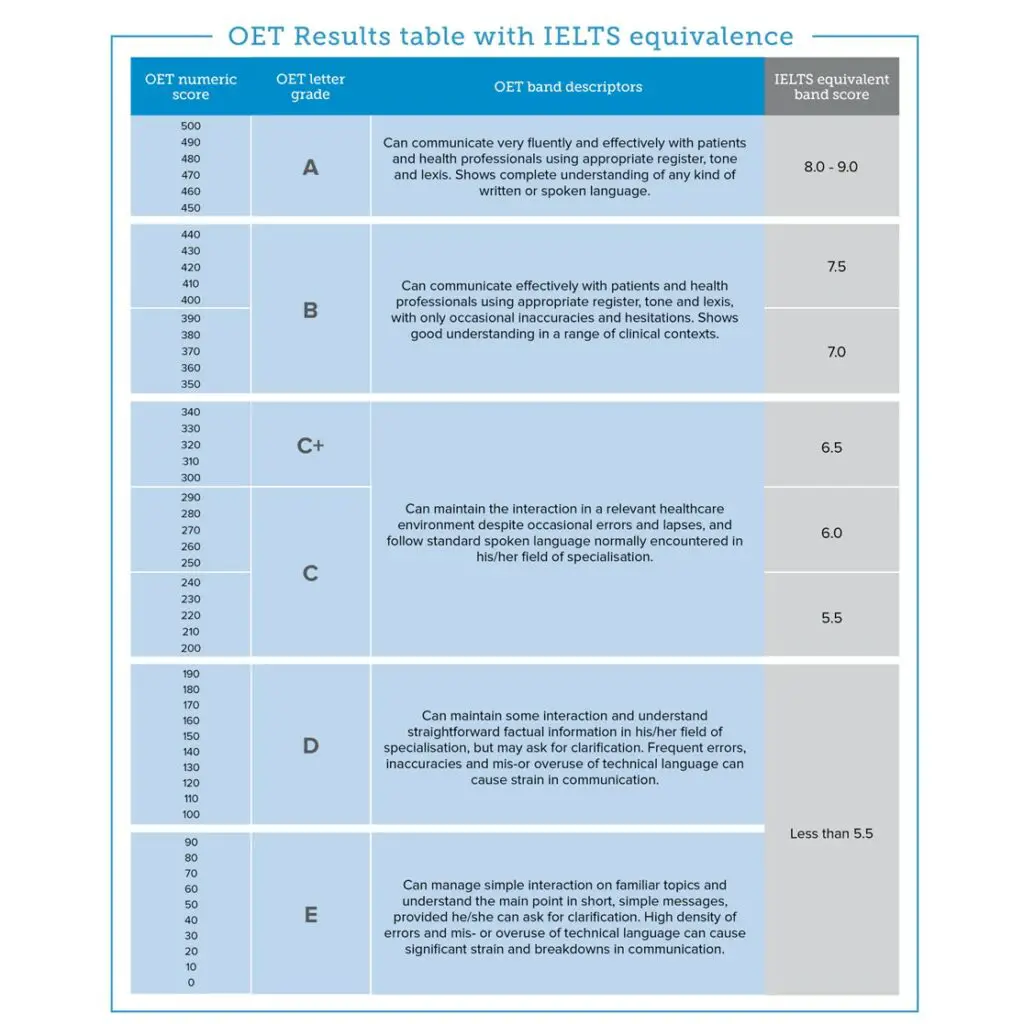OET, or the Occupational English Test, is created specifically for medical professionals to test their English proficiency. It is widely accepted and very popular in medical circles compared to other popular English tests such as IELTS or TOEFL. However, is OET different for doctors and nurses? If yes, how do they differ?
In general, the OET test is different for doctors and nurses. The reading and listening tests are similar, but the writing and speaking parts may differ. The tasks may be more relevant to their work, such as writing a discharge sheet for a doctor or completing patient history and vitals for a nurse.

This article explores the differences in the OET test for doctors and nurses and other issues about the differences. This includes why such differences exist and whether the passing marks differ between doctors and nurses.
Why Are OET Different for Doctors And Nurses?
The OET test is different for doctors and nurses because of the nature of the profession. They tend to be writing different documents and conversing on different subjects at work, meaning they should be tested differently. OET also has different writing and speaking tests for multiple other medical professions.
OET is a test developed specifically for medical professionals. Unlike general English proficiency tests such as IELTS or TOEFL, they can focus on assessing the language skills a medical professional will need.
OET probably realized that medical professionals use English differently at work. For example, a doctor may spend much more time writing medical reports, referral letters, or discharge sheets and explaining illness and medical conditions to patients. Nurses may spend more time writing and recording a patient’s medical history and perhaps explaining and reminding patients to take their medications.
As a result, OET structured the ‘production’ based tests such as writing and speaking differently, depending on the profession. As a result, a doctor may be asked to write a referral letter for a patient to another medical doctor in a writing test. In contrast, a nurse may be tested on how to write and describe vital signs and medical history.
In speaking, a doctor may be asked to describe a medical condition to a patient, while a nurse may be asked to explain to a patient how to take medications properly.
What Are the Other Professions That Have Different OET Tests?
OET officially listed twelve branches of medical professions that have different OET tests. These include medicine, dentistry, dietetics, nursing, occupational therapy, optometry, pharmacy, physiotherapy, podiatry, radiography, speech pathology, and veterinary science.
When looking at OET’s official website , it listed 12 medical professions that have separate OET tests. Common medical professions such as medicine, dentistry, or nursing are on the list, as well as less common ones such as podiatry (foot and ankle specialist) and speech pathology.
, it listed 12 medical professions that have separate OET tests. Common medical professions such as medicine, dentistry, or nursing are on the list, as well as less common ones such as podiatry (foot and ankle specialist) and speech pathology.
These professions may have separate tests because OET identified that these professionals engage in different types of work and may require the use of English differently. For example, a radiologist may need to use English to instruct patients. In contrast, dentists may need more languages to calm patients during a dental procedure.
As such, they are assessed differently in speaking and writing. They may be requested to perform different tasks in speaking and writing tests.
Is OET For Nurses Easier Than For Doctors?
There is little difference in the general difficulty between OET for nurses and doctors. This is because the difference is in the tasks and not the difficulty. Both doctors and nurses take the same listening and reading tests and perform speaking and writing tests related to their profession.
There may be little point in differentiating the difficulty between OET for nurses and doctors, as in general, the differences are not in difficulty but in the tasks.
For example, a doctor is not graded differently than a nurse. They both get scores assigned from 0-500. It is not like a doctor is graded from 0-700. This means there is equality in grading.
A doctor is also not made to answer more questions or have additional parts in the papers. They answer an equal amount of questions as nurses. Doctors and nurses are given the same time to complete the tasks. This means there is also equality in task amount and time.
The only difference is in the tasks required during the speaking and writing test. It can be argued that there is still an equality of difficulty here, as doctors and nurses are required to perform tasks relevant to their field of work. It is not like the doctor has to write a veterinarian report suddenly.
Are OET Passing Marks Different For Nurses Than Doctors?
OET marks are similar across all medical professions. The only difference is that doctors are often required to have a higher OET score than nurses for acceptance into workplaces or to qualify for a visa. This made sense as doctors are required to perform much more complicated tasks, which may require higher English proficiency.
In general, every medical profession in OET is given the same score, between 0-500. This is regardless if you are a doctor, dentist, nurse, or vet. The grading is also similar.


This means you will be given the same scoring criteria regardless if you are a nurse or a doctor. The determination if you pass or fail your OET is the same.
In fact, OET does not assign a ‘fail’ grade. The only determination of if you pass or fail your OET will be whether your scores qualify you to apply for what you want.
Another way you may determine if you pass or fail your OET is whether you have to resit the test because you are unsatisfied with your score. Check the blog about the OET score and how it’s calculated.
The only place you may see some higher requirements would be during application for openings or work visas to enter foreign countries for work. Generally, a medical doctor must often show a higher OET score to qualify for positions or visas to work in foreign countries than nurses.
For example, in the US, a minimum score of 350 is required, which is a B grade across all subtests of speaking, writing, listening, and reading. However, nurses seem to be given some leeway, with states such as Florida allowing overall grades as low as C+ minimum.
Is the OET Listening Similar To All Professions?
OET Listening tests are similar across all professions. Aside from listening, all candidates take the same reading test. There is no official explanation from OET, but ‘input’ based skills are generally similar, regardless of profession. This may explain why the decision to have all candidates sits for the same reading and listening test.
All OET candidates sit for the same reading and listening tests but have different tasks during writing and speaking tests. There is no official explanation from OET on the reason. Still, it makes sense to differentiate writing and speaking tests by profession since each profession may be using English differently during their work.
However, the decision to have all candidates sit for the same reading and listening test may be because reading and listening are ‘input’ based skills. The skills required to be good in reading and listening may be similar across all professions.
For example, a good reader can summarize information from a paragraph to a table. This skill should be tested across all professions. For listening, all medical professionals may need to have skills to listen across accents. Therefore it makes sense to have all candidates sit for the same reading and listening tests.
